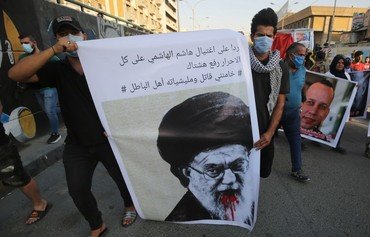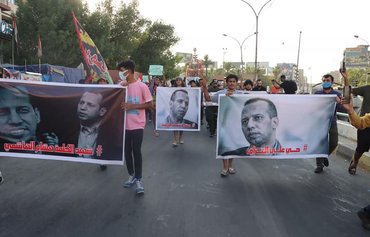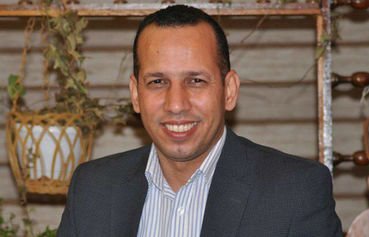The killing of extremism expert Hisham al-Hashemi has stirred fears Iraq is entering a dark and violent phase, as boiling tensions between pro-Iran factions and the government reach new heights.
Al-Hashemi, 47, was gunned down outside his home in east Baghdad late Monday (July 6th) by masked assailants on motorcycles.
Experts say the death signals a dramatic turn for political violence brewing since mass protests erupted in October.
"Armed forces of various affiliations have killed protestors and others willing to publicly criticise the government and armed forces with impunity," said Belkis Wille of Human Rights Watch.
![Iraqi demonstrators hold a sign that reads 'the voice of right killed with the bullet of wrong' at a symbolic funeral for slain Iraqi extremism expert Hisham al-Hashemi on July 7th at Baghdad's Tahrir square. [Ahmad al-Rubaye/AFP]](/cnmi_di/images/2020/07/08/24893-Iraq-Hisham-Hashemi-600_384.jpg)
Iraqi demonstrators hold a sign that reads 'the voice of right killed with the bullet of wrong' at a symbolic funeral for slain Iraqi extremism expert Hisham al-Hashemi on July 7th at Baghdad's Tahrir square. [Ahmad al-Rubaye/AFP]
"But killing someone of his stature smacks of a country where some groups have become so emboldened by the complete impunity for serious abuses, that they can kill anyone they want to without paying a price," she said.
Over the course of years, al-Hashemi had developed a vast network encompassing top decision makers, former extremists and rival political parties, often mediating among them.
His exceptional access had granted him a level of protection, those close to him said, but the balance started to tip in October.
His support for popular protests against a government seen as too close to Iran infuriated Tehran-backed factions in the Popular Mobilisation Forces (PMF).
Al-Hashemi skirted threats to mediate between protestors and senior government officials, even as activists were fatally shot outside their homes and dozens more abducted.
'A new modus operandi'
"The parameters changed starting in October. There was a new modus operandi, and a shift in the confrontation with pro-Iran factions," said Adel Bakawan, an Iraqi expert who knew al-Hashemi.
Other experts say the real turning point was in January, when top Iranian general Qassem Soleimani and PMF deputy head Abu Mahdi al-Muhandis were killed in a US airstrike near Baghdad airport.
Hardline factions within the PMF, particularly those close to Iran like Kataib Hizbullah, vowed revenge against the US and its allies inside Iraq.
As someone with close ties to foreign governments, al-Hashemi was seen as a potential target, and he left Baghdad for a few days in late January.
"Hisham was aware that things had shifted," said Renad Mansour, a researcher at London-based Chatham House who worked with al-Hashemi for years.
"The killing of Abu Mahdi unleashed all of these groups that he had been trying to control and centralise. We are still feeling the shock waves," he said.
Within the network, Kataib Hizbullah accused Mustafa Kadhemi of complicity in the deadly strike and deeply opposed his rise to Iraq's premiership in May.
Al-Hashemi had advised Kadhemi for years, a relationship that put him in "danger" when the former intelligence head became prime minister, those close to him said.
Al-Hashemi had been critical of rogue elements of the PMF and had received threats from at least two hardline factions, his associates said. His family said he had been threatened by the "Islamic State of Iraq and Syria" (ISIS).
"This is a political assassination that represents both the silencing of freedom of speech, and a challenge to the government, its prime minister and any reform plan," said Iraqi politician Raed Fahmi.

![Iraqi demonstrators wearing face masks to protect against coronavirus attend a symbolic funeral for slain Iraqi extremism expert Hisham al-Hashemi on July 7th at Baghdad's Tahrir square. [Ahmad al-Rubaye/AFP]](/cnmi_di/images/2020/07/08/24892-Iraq-Hashemi-protesters-600_384.jpg)






